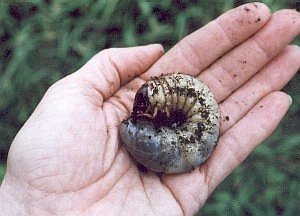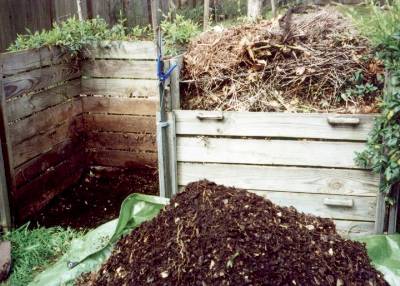
 In fact, the picture-perfect composting systems touted by gardening magazines and yard equipment sales outlets are as much fantasy as the idea that vegetable gardening will save money in food costs. First of all, the things we put in the bins do not decompose quickly. We made the mistake of adding live oak leaves, which are second only to plastic in their durability. Holly leaves, pine needles, and palm fronds are also not quick to deteriorate. However, those are the things we need to dispose of. Second, composting takes water. When our plants are languishing through the hot, dry summers, we are not about to waste costly water on something as low in priority as rotting vegetation piles. Third, compost bins need a lot of attention and energy if they are to function as advertised. Turning the piles on a regular schedule has NEVER happened.
In fact, the picture-perfect composting systems touted by gardening magazines and yard equipment sales outlets are as much fantasy as the idea that vegetable gardening will save money in food costs. First of all, the things we put in the bins do not decompose quickly. We made the mistake of adding live oak leaves, which are second only to plastic in their durability. Holly leaves, pine needles, and palm fronds are also not quick to deteriorate. However, those are the things we need to dispose of. Second, composting takes water. When our plants are languishing through the hot, dry summers, we are not about to waste costly water on something as low in priority as rotting vegetation piles. Third, compost bins need a lot of attention and energy if they are to function as advertised. Turning the piles on a regular schedule has NEVER happened.
Our bins have nice removable doors at the front for easy access. Even after many years, they still function like they are supposed to. The enclosures are big enough and there are two of them, so that we should be able to fill one, then shift it to the other on a rotating basis. Yeah, right. At times, the amount of debris produced by the vegetation in our yard has far exceeded even the 8' x 4' x 4' volume of our bins. One side would be filled, then the other. This leaves no room for maneuvering the contents. I found that I could pack things down by climbing on top and jumping on it. However, this never solved the problem of how to remove the recent top stuff to get at the rotted lower stuff. One time, when the situation had come to a standstill, I took a big tarp and used it to hold a temporary third pile. This solved everything. I got plenty of exercise shifting all that refuse twice, as well as extracting several wheelbarrow's worth of nicely composted mulch for our gardens.
Yes, after several years, the bins do yield a very useful organic mix for our gardens. There is probably a lot there right now. I've noticed that, for years at a time, I can keep adding to the bins, albeit not too rapidly, and the level still recedes. Unless underground animals are removing it from below, or the cockroaches are eating it all and pooping it out someplace else (a distinct possibility), the only explanation is that it is rotting down to its basic ingredients, just like it is supposed to do.

There is one more problem with extracting the final product from our bins. Various animals like to call the compost piles home. Sometimes little snakes, toads, and lizards find safe haven, as well as ample food. If I dig in with a shovel, it is very likely going to cut some innocent little creature in half. Some of my favorite compost residents are the ox beetles. The large brown beetles lay their eggs in the depths of the debris, and the grubs, which grow to be large enough to cover my palm, happily munch on rotting wood for at least a year or two. Once they pupate, they cannot move out of harm's way and I just don't enjoy finding their body bits mixed in with the mulch. More than once I've started to clear out a bin, only to stop when I encountered some terrified resident.
So are the compost bins worth the construction time and resources, as well as the space in our yard? You bet they are! If nothing else, they at least offer a convenient disposal site for casual yard trimming and leaves, good fauna habitat, and a nice structure on which to allow vines to grow. The rich mulch that we remove on a very haphazard basis is just icing on the cake, or, more appropriately, on the gardens.